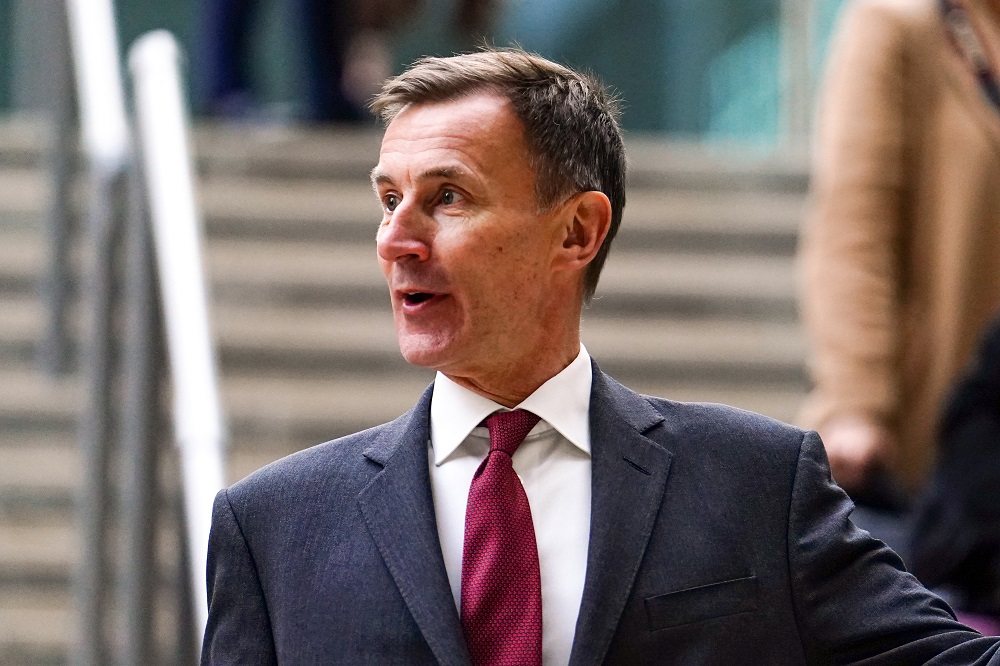Calls for bigger public sector pay increases after January budget surplus

Chancellor Jeremy Hunt is facing pressure to improve public sector pay rises for workers next month after official figures showed state finances were stronger than expected.
The Office for National Statistics revealed on Tuesday that the Government reported a surprise monthly surplus of £5.4 billion in January, driven by record returns from self-assessed income tax.
It comes weeks before Mr Hunt will set out his plans for tax and spending in the Budget on March 15.
Economists have highlighted that public finances are weaker than a year ago but appear noticeably more robust than recent forecasts.
Cara Pacitti, senior economist at the Resolution Foundation, said: “The Chancellor is approaching his upcoming Budget with significantly healthier borrowing levels than was forecast last Autumn.
“The extra fiscal headroom should allow him take on some key issues, however – namely corporate reform, boosting workforce participation and preventing a spike in energy bills this spring.”
January’s figure was a £7.1 billion smaller surplus than in January 2022 but was £5 billion larger than had been previously predicted by the Office for Budget Responsibility.
A budget surplus takes place when tax revenue received is larger than government spending.
Surprised
Economists were surprised by the surplus having predicted borrowing of £7.8 billion for the month, according to a consensus from Pantheon Macroeconomics.
The Chancellor said he was committed to reducing debt despite the improved monthly performance.
Mr Hunt said: “We are rightly spending billions now to support households and businesses with the impacts of rising prices – but with debt at the highest level since the 1960s, it is vital we stick to our plan to reduce debt over the medium term.
“Getting debt down will require some tough choices, but it is crucial to reduce the amount spent on debt interest so we can protect our public services.”
However, Michal Stelmach, senior economist at KPMG UK, said the figures showed finances are more than £30 billion better off than recent OBR forecasts projected.
He said: “Government spending on subsidies – which include the energy support – so far came in £6.8 billion below the £44 billion expected by the OBR this fiscal year, suggesting that milder weather and lower demand for gas have helped keep the cost down.
“Year-to-date borrowing has so far undershot the OBR’s forecast by £30.6 billion, which could tempt the Chancellor to offer a pay increase to public sector workers as part of his Budget next month, hoping to prevent another wave of strikes.”
Deadlock
Paul Nowak, general secretary of the TUC union, said the rosier picture means “the government is running out of excuses” not to offer an improved pay deal.
“Jeremy Hunt must come out of hiding and help break the deadlock on public sector pay,” he added.
However, Martin Beck, chief economic advisor to the EY ITEM Club, stressed that better borrowing figures “may not translate into more fiscal headroom for the Government”.
He said: “The extent to which the OBR deems the improvement in tax revenues to be structural is uncertain, and there’s a question mark over how it will adjust its estimates of the economy’s potential output growth in next month’s Budget.”
The surplus was partly driven by £21.9 billion of self-assessed income tax receipts for the month, which represented the highest total for the month since records began in 1999.
This partly offset higher spending as a result of energy support for households and businesses due to rocketing prices.
Energy suppliers
In January, payments to energy suppliers hit roughly £8 billion as a result of the Government’s price cap schemes.
It also confirmed that the fourth round of payments under the energy bills support scheme – which paid £400 to households over six months to help cut their bills – cost a further £1.9 billion.
The ONS said central government spending jumped by more than £20 billion to £103.6 billion for January, compared with the same month last year.
This included £6.7 billion of interest on government debt – the highest January reading since records began.
January also saw a £2.3 billion charge to the UK brought by the EU and relating to undervalued customs duties on Chinese footwear and textiles while the UK was a member state.
The higher interest payment comes after continued interest rate increases by the Bank of England. The rate is now 4%.
The UK’s overall national debt was almost £2.5 trillion in January, reflecting an increase of £143.4 billion compared with the previous January.
It means debt as a share of the economy represented 98.9% of UK GDP, hitting levels “last seen in the early 1960s”, according to the ONS.
Support our Nation today
For the price of a cup of coffee a month you can help us create an independent, not-for-profit, national news service for the people of Wales, by the people of Wales.







Pretty much a no-brainer that during a cost of living crisis when the price of everything from cement to petrol is going through the roof that VAT and duty receipts follow.
Public school and PPE at Oxford didn’t do him much good if this comes as a surprise.
No sooner than the workforce get a pay rise or pension/benefit increases there is someone guaranteed to be waiting in the wings to take it off you in the form of water, energy, council tax, food, fuel etc. increases. It’s a no-win situation for 95% of us. It does not affect the 5% who are filthy rich.